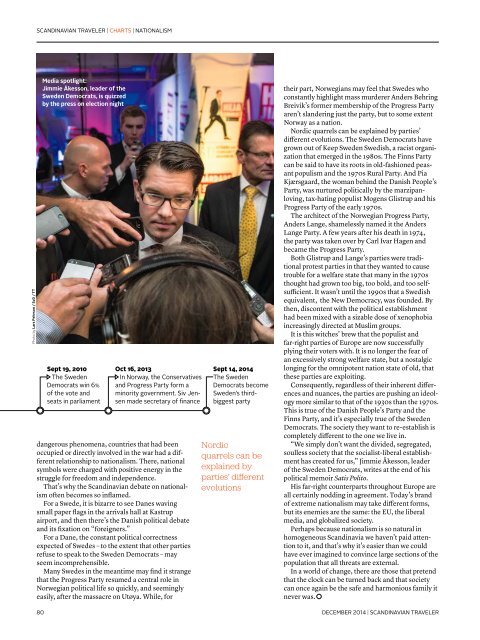st1412_webb
st1412_webb
st1412_webb
You also want an ePaper? Increase the reach of your titles
YUMPU automatically turns print PDFs into web optimized ePapers that Google loves.
SCANDINAVIAN TRAVELER | CHARTS | NATIONALISM<br />
Photo by Lars Pehrson / SvD / TT<br />
dangerous phenomena, countries that had been<br />
occu pied or directly involved in the war had a different<br />
relationship to nationalism. There, national<br />
symbols were charged with positive energy in the<br />
struggle for freedom and independence.<br />
That’s why the Scandinavian debate on nationalism<br />
often becomes so inflamed.<br />
For a Swede, it is bizarre to see Danes waving<br />
small paper flags in the arrivals hall at Kastrup<br />
airport, and then there’s the Danish political debate<br />
and its fixation on “foreigners.”<br />
For a Dane, the constant political correctness<br />
expected of Swedes – to the extent that other parties<br />
refuse to speak to the Sweden Democrats – may<br />
seem incomprehensible.<br />
Many Swedes in the meantime may find it strange<br />
that the Progress Party resumed a central role in<br />
Norwegian political life so quickly, and seem ingly<br />
easily, after the massacre on Utøya. While, for<br />
80<br />
Media spotlight:<br />
Jimmie Åkesson, leader of the<br />
Sweden Democrats, is quizzed<br />
by the press on election night<br />
Sept 19, 2010<br />
The Sweden<br />
Democrats win 6%<br />
of the vote and<br />
seats in parliament<br />
Oct 16, 2013<br />
In Norway, the Conservatives<br />
and Progress Party form a<br />
minor ity government. Siv Jensen<br />
made secretary of finance<br />
Sept 14, 2014<br />
The Sweden<br />
Democrats become<br />
Sweden’s thirdbiggest<br />
party<br />
Nordic<br />
quarrels can be<br />
explained by<br />
parties’ different<br />
evolutions<br />
their part, Norwegians may feel that Swedes who<br />
constantly highlight mass murderer Anders Behring<br />
Breivik’s former membership of the Progress Party<br />
aren’t slandering just the party, but to some extent<br />
Norway as a nation.<br />
Nordic quarrels can be explained by parties’<br />
different evolutions. The Sweden Democrats have<br />
grown out of Keep Sweden Swedish, a racist organization<br />
that emerged in the 1980s. The Finns Party<br />
can be said to have its roots in old-fashioned peasant<br />
populism and the 1970s Rural Party. And Pia<br />
Kjærsgaard, the woman behind the Danish People’s<br />
Party, was nurtured politically by the marzipanloving,<br />
tax-hating populist Mogens Glistrup and his<br />
Progress Party of the early 1970s.<br />
The architect of the Norwegian Progress Party,<br />
Anders Lange, shamelessly named it the Anders<br />
Lange Party. A few years after his death in 1974,<br />
the party was taken over by Carl Ivar Hagen and<br />
became the Progress Party.<br />
Both Glistrup and Lange’s parties were traditional<br />
protest parties in that they wanted to cause<br />
trouble for a welfare state that many in the 1970s<br />
thought had grown too big, too bold, and too selfsufficient.<br />
It wasn’t until the 1990s that a Swedish<br />
equivalent, the New Democracy, was founded. By<br />
then, discontent with the political establishment<br />
had been mixed with a sizable dose of xenophobia<br />
increasingly directed at Muslim groups.<br />
It is this witches’ brew that the populist and<br />
far-right parties of Europe are now successfully<br />
plying their voters with. It is no longer the fear of<br />
an excessively strong welfare state, but a nostalgic<br />
longing for the omnipotent nation state of old, that<br />
these parties are exploiting.<br />
Consequently, regardless of their inherent differences<br />
and nuances, the parties are pushing an ideology<br />
more similar to that of the 1930s than the 1970s.<br />
This is true of the Danish People’s Party and the<br />
Finns Party, and it’s especially true of the Sweden<br />
Democrats. The society they want to re-establish is<br />
completely different to the one we live in.<br />
“We simply don’t want the divided, segregated,<br />
soulless society that the socialist-liberal establishment<br />
has created for us,” Jimmie Åkesson, leader<br />
of the Sweden Democrats, writes at the end of his<br />
political memoir Satis Polito.<br />
His far-right counterparts throughout Europe are<br />
all certainly nodding in agreement. Today’s brand<br />
of extreme nationalism may take different forms,<br />
but its enemies are the same: the EU, the liberal<br />
media, and globalized society.<br />
Perhaps because nationalism is so natural in<br />
homo geneous Scandinavia we haven’t paid attention<br />
to it, and that’s why it’s easier than we could<br />
have ever imagined to convince large sections of the<br />
population that all threats are external.<br />
In a world of change, there are those that pretend<br />
that the clock can be turned back and that society<br />
can once again be the safe and harmonious family it<br />
never was.<br />
DECEMBER 2014 | SCANDINAVIAN TRAVELER



